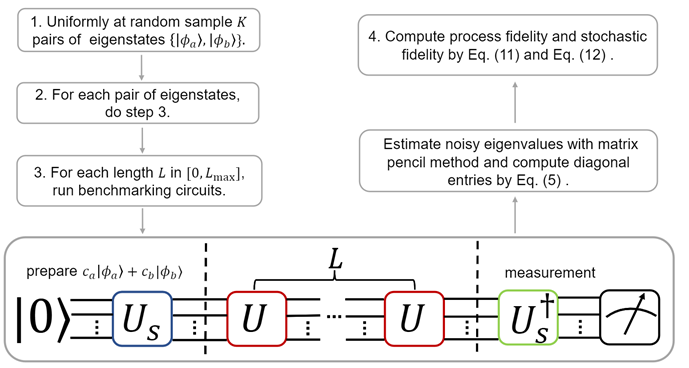Progress Made in quantum benchmarking by BAQIS Quantum Operating System Group
2023/09/25
Recently, the Quantum Operating System Group at Beijing Academy of Quantum Information Sciences (BAQIS) made significant progress in the field of quantum benchmarking. They have proposed a benchmarking approach based on the eigenvalues of noisy channels of quantum gates, referred as 'channel spectrum benchmarking'. This method is helpful for characterizing and calibrating global entangling gates and commonly used modules in quantum algorithms, and will provide support for the development of cleaner and larger-scale quantum devices. On September 21, 2023, the research results were published in Nature Communications under the title 'Benchmarking universal quantum gates via channel spectrum'.
Noise is a main factor limiting the performance of current quantum computers. Quantum benchmarking can provide information about the noise in quantum gates and use that information to calibrate and optimize quantum gate operations to improve their fidelity. The current mainstream benchmarking methods are randomized benchmarking and its variants. These methods simplify the noise types by running random circuits, making it relatively easy to obtain the average error rate of the noise from measurement signals. However, these methods have the following drawbacks: 1. They cannot directly provide noise information for the target gates; 2. They are only applicable to specific sets of quantum gates; 3. They cannot directly provide information about coherent errors.
To address the aforementioned challenges, we have introduced a novel benchmarking approach called "Channel Spectrum Benchmarking (CSB)’’. The process of this approach is illustrated in Figure 1. This method obtains noise information by measuring the eigenvalues of the quantum channel corresponding to the noisy quantum gates. By comparing these eigenvalues with those of ideal quantum gates, we can determine the process fidelity (average fidelity), random fidelity (coherence), and some unitary parameters for the target quantum gates. This approach is insensitive to state preparation and measurement errors, can characterize universal quantum gates, and can be extended to multi-qubit systems. We have demonstrated the performance of this approach through several simulated experiments, such as the two-qubit Fsim gate (Figure 2) and the ten-qubit Ising evolution operator (Figure 3). It is evident that this approach accurately estimates the noise information of quantum gates. We believe that this benchmarking approach, combined with quantum gate calibration, can provide significant assistance in developing cleaner and larger-scale quantum devices.

Figure 1. The workflow of the Channel Spectrum Benchmarking (CSB). First, pairs of eigenstates for the target gate are randomly sampled. For each pair of eigenstates, the control-free phase estimation algorithm is applied. In this algorithm, we start by preparing a superposition state of the two eigenstates as the initial state. Then, the target gate is repeatedly applied times (with ranging from [0, L_max]). Finally, we measure the probability of obtaining the initial state.
The probabilities obtained from circuits of different depth form an array, and these probabilities can be used to extract the eigenvalues of the noisy target quantum gate using signal processing techniques like the matrix pencil method. By obtaining several noisy eigenvalues from different initial states and their corresponding ideal eigenvalues, we can estimate the process fidelity and stochastic fidelity.

Figure 2. The channel spectrum benchmarking of a Fsim gate.


Figure 3. The channel spectrum benchmarking of a 10-qubit Ising evolution operator.
Dr. Yanwu Gu, an assistant researcher at BAQIS, is the first author of the paper, while Associate Professor Dong E. Liu at Tsinghua University and a concurrent researcher at BAQIS, along with Dr. Gu, are the corresponding authors. Other authors include Dr. Wei-Feng Zhuang and Dr. Xudan Chai, both are postdoctoral researchers in Quantum Operating System Group at BAQIS. This work has been supported by the National Natural Science Foundation of China, the Innovation Program for Quantum Science and Technology, and the Beijing Natural Science Foundation.
Article links:
https://www.nature.com/articles/s41467-023-41598-8#Sec10
 中文
中文 Email
Email QCloud
QCloud Log in
Log in
